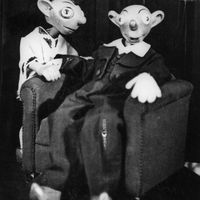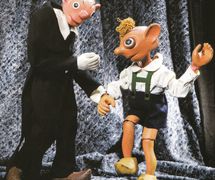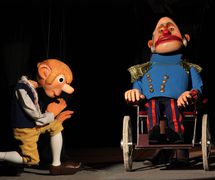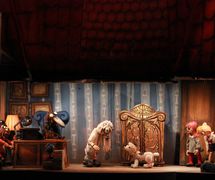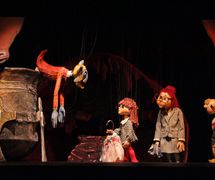Popular comic characters of the Czech puppet theatre, created by Josef Skupa. Respectively father and son, Spejbl and Hurvínek appeared as a comedic pair on the stage of the Loutkové divadlo Feriálních osad (Puppet Theatre of the Amusement Settlements) based in Pilsen (Plzeň). Spejbl was sculpted by wood carver Karel Nosek in 1920 following Skupa’s design. Conceived in the Dadaist spirit, Spejbl is dressed in a tuxedo with tails, snow-white gloves and wooden shoes; in contrast, the character is bald-headed, with large ears and protruding eyes. This opposition between different social symbols is also expressed in the personality of the puppet character: a simple man but clumsy, opinionated but mired in its contradictions, and torn between his social ambitions and his limited capabilities.
The Hurvínek puppet was carved in 1926 by Gustav Nosek. His appearance – peculiar movable eyes, a tuft of dishevelled hair, dressed in short pants held up by suspenders – gave Hurvínek the appearance of a rascally suburban street urchin. From the outset, Skupa gave the voices to both characters. He provided Spejbl with a mumbling bass and Hurvínek with a staccato falsetto that accentuated his inquisitive and provocative responses to whatever his father said. In the shows for children, Skupa softened the grotesque caricature of Spejbl, making him instead a more solicitous yet muddle-headed father figure.
After 1930, Spejbl and Hurvínek (or S+H) became the central protagonists for Skupa’s professional ensemble. Skupa then gave their names to the new theatre he founded in Prague in 1945, the Divadlo Spejbla a Hurvínka (Spejbl and Hurvínek Theatre, also known as S+H Theatre or Divadlo S+H). After Skupa’s death in 1957, the characters’ interpretation was taken over by Miloš Kirschner who minimized the weaknesses in Spejbl’s character and added dialogues of a more philosophical bent as a sounding board of the times. After the death of Kirschner in 1996, Martin Klásek took over the Spejbl and Hurvínek Theatre and became the interpreter of both figures in 1995.
During their existence, Spejbl and Hurvínek became a remarkably popular pair. Besides performing in theatre, Josef Skupa had popularized the comic duo, especially through radio programmes, and Miloš Kirschner continued to work on television as well as a series of gramophone recordings of the their repertoire. Today, Spejbl and Hurvínek are still alive and active in the Czech Republic as well as abroad, and their plays have been translated into eighteen languages.
(See Czech Republic.)
Bibliography
- Černý, František. “Jedenapadesátiletý otec a jeho čtyřicetiletý syn”. D S+H 1972, Divadlo Spejbla a Hurvínka k nedožitým 80. narozeninám prof. Josefa Skupy [Jedenapadesátiletý father and his son of forty years. D S+H 1972, Spejbl and Hurvínek Theatre to Prof. Josef Skupa on his 80th birthday]. Praha, 1972, pp. 73-78.
- Pavlovský, Petr. “Sémantika kostýmu a masky postav S+H” [The Semantics of Costume and Mask of the Characters S + H]. Československý loutkář [Czechoslovak Puppeteer]. No. 10, 1980, p. 223.









